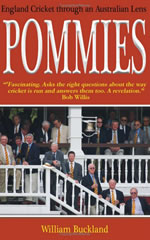Pommies
Martin Chandler |Published: 2008
Pages: 336
Author: Buckland, William
Publisher: Troubador Publishing Limited
Rating: 4 stars

Reading a cricket book is meant to be an enjoyable and relaxing way of spending some leisure time. Examples are biographies of the long retired, accounts of past matches and the thoughts and opinions of current players and journalists all of which, at their best, are an absolute pleasure to delve into.
Make no mistake “Pommies” is a book that should, indeed needs, to be widely read. That said to any English cricket supporter, and there are many of us, who hold the traditions of our game in any sort of high regard while it may be a compelling read it is also an uncomfortable one.
What William Buckland, an Englishman inspired by what he has observed of the game in Australia, has done is to carry out a root and branch review of the way in which the sport is run in England. His starting point is to set out a case for the 2012 Olympic stadium in London to be utilised as the National Cricket Stadium following the conclusion of the Games and to move on from there to look at the structure within which Cricket is run in this country.
In essence none of the points that Buckland makes are ones that have not been made before but they have seldom been put forward in such a coherent way. The reason for the importance of the book is that Buckland proposes solutions to the problems he identifies. Clear and concise responses to the issues are set out supported by impeccable logic and empirical evidence.
Buckland has taken his ideas to the highest echelons of Cricket and Politics in this country. His ideas have been praised by many with those mavericks Willis and Atherton high on the list of admirers yet his suggestions seem not to have found much support with those who could actually put into practice the reforms he suggests. Inevitably the idea of banishing Lords, The Oval and the other traditional Test venues to a second tier is anathema to many but the concept of playing Test Cricket in an 80,000 seat stadium remains a compelling one.
An important part of the book sets out, in the context of what Buckland is setting out to demonstrate, why the Kerry Packer inspired “Cricket War” of the late 1970’s took place and what has happened to cricket in Australia since. As we all know, the Australian game has enjoyed a golden age since then of the sort that I and all other English supporters hope we can emulate in the future. The abiding message of William Buckland’s admirable effort is to confirm our hopes that we can indeed match the Australian success story. The sting in the tail is that after reading his book we also know that in order to achieve that success we have to make changes to our domestic game of such significance that it would simply no longer be recognisable to a visitor from the nineteenth or twentieth centuries.
It is now more than a year since “Pommies” was published and the initial impetus that Buckland’s ideas had appears to have been lost. It seems that the group of white males, almost all middle-aged or older, bedecked in their “egg and bacon” ties, who stare out at us from the image on the dust jacket have made their decision and that continued mediocrity, with an occasional burst of success, is the choice that has been made.






Leave a comment